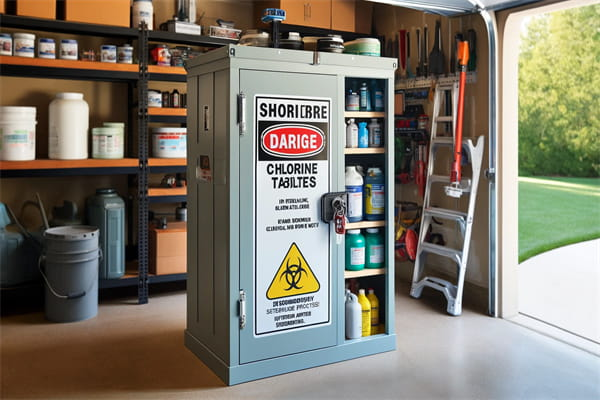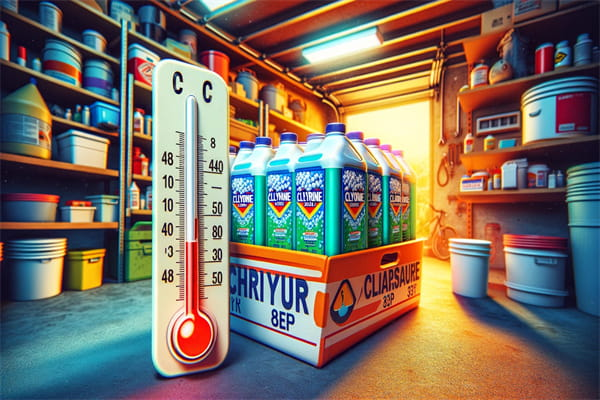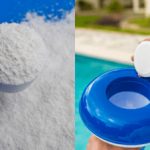When it comes to chemical storage, one of the most common questions we get is: “Can I store chlorine tablets in the garage?” It’s a valid query, given that garages often serve as the go-to storage space for all sorts of home and garden chemicals. However, when it comes to chlorine tablets, which are crucial for keeping your pool sparkling clean and free of harmful bacteria and algae, the garage might not be your best option. In this blog, we’ll dive into why that is, what potential risks you might face, and how to store your chlorine safely if the garage is your only option.
Ⅰ. The Hazards of Storing Chlorine Tablets in the Garage
1. High Temperature Risks
Garages often lack proper climate control, leading to high temperatures during the summer months. This excessive heat can accelerate the degradation of chlorine tablets, causing them to lose potency faster than expected. Moreover, the high heat may lead to the premature release of chlorine gas, posing health risks to humans and animals.
2. Low Temperature Risks
In contrast to the summer heat, winter months can see drastically lower temperatures that can harden chlorine tablets, altering their chemical structure. This can make them less effective once temperatures rise, leading to inconsistent chlorine levels in your pool when you begin to use them again.
3. Clumping and Chemical Degradation
Extended exposure to moisture can cause chlorine tablets to clump together, which complicates their usage and leads to uneven distribution of chlorine in pool water. Additionally, degradation from humidity can reduce the lifespan and effectiveness of the chlorine, requiring more frequent replacement and increased costs.
4. Accessibility to Children and Pets
Garages are generally more accessible than other storage areas, posing a risk if children or pets gain access to chlorine tablets. These chemicals are highly toxic and can be fatal if ingested, making secure storage imperative.
5. Risk of Contamination and Corrosion
Storing chlorine tablets in the same area as vehicles, lawn equipment, and other machinery can be dangerous if these items leak oil, gasoline, or other fluids. Chemical reactions between chlorine and these substances could potentially produce toxic gases or even cause fires. Additionally, chlorine vapors or spills can corrode metal surfaces and tools, damage paintwork on vehicles, and deteriorate other items stored in the garage.
Ⅱ. Safety Protocols If Storing in the Garage Is Unavoidable
If you find yourself with no alternative but to use the garage for storing your chlorine tablets, here are some essential safety protocols to follow:
1. Proper Ventilation
Ensure your garage is well-ventilated. Chlorine can emit gases, especially if it starts to degrade or react with other substances, and proper airflow can help mitigate the accumulation of any harmful gases.
2. Secure Storage
Invest in a chemical storage cabinet with a lock. This will help isolate the chlorine from any environmental factors in the garage and prevent accidental access by children or pets.
3. Environmental Controls
Consider using a dehumidifier to keep the area dry and maintain a more consistent temperature if possible. This can help extend the life of your chlorine tablets by providing a more stable environment.
Ⅲ. Tips for Safe Storage of Chlorine Tablets
1. Original Packaging
Always keep chlorine tablets in their original packaging. These containers are specifically designed to handle the chemical’s properties and include child safety features to prevent accidental openings.
2. Avoid Mixing Chemicals
Never store chlorine tablets near gasoline, garden chemicals, or any other substances that could lead to dangerous chemical reactions. This precaution is crucial in preventing potential fires or toxic gas formations.
3. Regular Checks
Make it a routine to check on the condition of your chlorine tablets. Look for any signs of moisture entry, clumping of the tablets, or container damage. Regular inspections will help ensure that the tablets remain effective and safe to use.
Ⅳ. Conclusion
While the garage might seem like a convenient spot for storing all sorts of household items, chlorine tablets require a bit more care due to their chemical nature and the potential hazards they present. By following the guidelines above, you can ensure that your chlorine tablets remain effective and, most importantly, safe.





